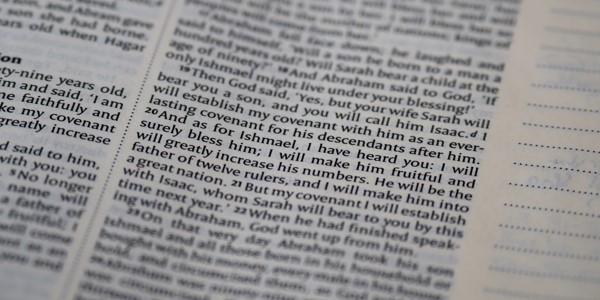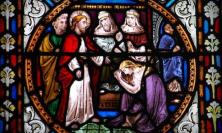In times of rupture, confusion and complexity, we might find ourselves looking more intently than ever for God; and if we are not ready to read the signs of his presence, we may well lament: ‘where is God?’ The characters we meet in Matthew’s genealogy of Jesus, which features twice in our liturgies in the run-up to Christmas, help us to answer that question. Nicholas King SJ relates their ordeals to assure us that God is in every story.
A question that has surfaced quite often in 2020 (and not just this year, of course, for it leaps often to our lips) is: ‘Where is God in all this?’ That question has a particular sharpness at this time when the coronavirus has turned all our lives upside down, making them impossible to plan, and bringing us face-to-face with death and loneliness and our human frailty.
Given all this, it seemed a useful idea to approach the question by way of Matthew’s Gospel, which we have been hearing on Sundays over the course of the last twelve months. Matthew begins and ends his gospel with the notion of ‘God with us’. His first Old Testament reference is to Isaiah 7:14, ‘and they shall call his name “Emmanuel”’; and to this last word the evangelist kindly appends a translation that was not in the Greek of Isaiah: ‘God with us’. Then almost the last words of the gospel repeat that theme, when the risen Jesus appears to the eleven on the mountain in Galilee, and reveals that he is indeed risen, and that they have a job to do, namely to ‘make disciples of all the nations, baptising them in the name of the Father and of the Son and of the Holy Spirit’, and that the reason that it is possible at all is the unfailing presence of Jesus: ‘Look! I am with you all the days, until the consummation of the age’. At the beginning and the end of this remarkable gospel, therefore, Jesus is offered to us as the unfailing presence of God; and the idea surfaces again, rather over halfway through the gospel, in the so-called ‘Church Discourse’: ‘where two or three are gathered into my name, I am there in the middle of you’ (18:20).
And there is a bit more, for the idea is there also in Matthew’s genealogy, which is read at Mass just over a week before Christmas, on 17 December, and again at the vigil Mass of Christmas. This is a passage not to be missed, for Matthew’s first readers or hearers (who knew their Old Testament very well indeed) would have turned a knowledgeable eye upon it; and they would easily have read what the evangelist was saying about the presence of God in the story. That presence is central to his gospel. This is the point of the saying at 13:52, at the end of the Parable Discourse, when he talks about himself as ‘a scribe discipled in the Kingdom of the Heavens…who brings out new things and old’. The God of Israel is in the story here.
And that is exactly what Matthew’s genealogy is about: the ancient presence of God in the story of Jesus. The overall structure of the genealogy is simple: it has three sections, each of which represents a portion of the story of Israel, of which the birth of Jesus is the climax. Section 1 traces the story from Abraham to David; and in a sense Israel’s story begins here, with the promises made to the patriarch. Section 2 traces Jesus’s ancestry, and Israel’s story, through the complex and in many ways disedifying tale of David and his offspring, when at first sight God’s promise was fulfilled. Then section 3 starts with that terrible moment of the deportation to Babylon, when it seemed that God had after all gone back on his promises. At the end of it all, it turns out that Jesus is the climax of God’s presence in Israel’s history, and that God cannot possibly abandon his chosen people. And all this is presented in a code that Matthew’s Jewish readers could not have failed to read.
Let us look at some of the names of Jesus’s ancestors, to see how God was always there in the family tree. We start, inevitably, with the three great patriarchs, Abraham, Isaac and Jacob. They were in many respects a pretty ropey lot: Abraham twice tried to make Sarah out to be his sister, and behaved abominably by Hagar; and he was even willing to sacrifice his son Isaac (admittedly at God’s instructions), but God was present in their story. Isaac is the only one of these patriarchs to have only one wife and no concubines, though like his father he lies about his wife, pretending that Rebekah is his sister; and he gets tricked into giving Jacob the blessing promised to his eldest son. Like his father, Isaac is given the assurance that God is with him: ‘I am the God of your father Abraham. You have no need to fear, since I am with you’ (Genesis 26:24). The presence of God is unmistakable throughout the story.
Jacob, as the story of the blessing shows, was something of a trickster, from his birth (Genesis 25:19-26), when he came out of the womb clinging to his brother’s heel. He was also not a very good parent, absurdly favouring his son Joseph over the rest, which understandably encouraged the other brothers to loathe the boy. Somehow it all worked out, however, and once they are reunited, now in Egypt, Joseph was able to tell his brothers (three times in as many verses!) that ‘God sent me here ahead of you’. This is all part of the story that Matthew is telling: God is in the story, whatever it may look like.
Judah is one of those brothers of Jacob; and his story (look at Genesis 38), which for some reason interrupts the Joseph saga, was far from creditable. He had two sons, Er and Onan, who were both married in turn to Tamar, and died before their time. By rights, Tamar (about whose family background we are, perhaps significantly, told nothing at all) should then have been married to Judah’s third son, Shelah, but understandably, not wishing to lose any more sons, Judah just sent her home. She, however, was a woman of some resource, and went off and pretended to be a prostitute, sitting where Judah was likely to pass. Judah fell in with her, and in token of payment left her a cord and signet ring and staff. When she was discovered to be pregnant, Judah decreed (presumably as father-in-law, though he had hardly lived up to his position) that she was to be burned. At this stage she produced the cord and signet ring and staff, to identify the father of the child. Finally he admitted what he had done and Tamar (with whom, we gather, he never again had intercourse) was brought back into the family, and included among the ancestors of Jesus.
The next name for us to mention here is Rahab; if Tamar only pretended to be a prostitute, Rahab actually was a member of that ancient profession. She believed in Israel’s God, and helped Joshua’s spies to escape when they were being hunted by the authorities in Jericho. According to Joshua 2 she and her family were the only inhabitants of Jericho to be spared at the time of the Israelite assault (thanks to a scarlet rope). Indeed, according to Matthew and certain Jewish sources, she later married Joshua. The point for us to digest is that God was in her story.
Ruth is also mentioned in our genealogy. She comes in a beautiful story that our Bible aptly places immediately after those horrible episodes that come at the end of the Book of Judges. Ruth insists on staying with her mother-in-law, Naomi, who is going home from Moab, back to Bethlehem. Naomi tells her that ‘my lot is too bitter for you, because the Lord has extended his hand against me’, but Ruth insists that ‘your people shall be my people, and your God shall be my God’. Once again, God is in the story, and we know that it is going to be all right. And so indeed it turns out, as you will find if you just read through the four short chapters of the book. Ruth becomes the great-grandmother of King David; and there can be no doubt at all that God is in the story.
Finally, of course, there is Mrs Uriah. At a time when David should have been at war (you will find this appalling story in 2 Samuel 11, starting at verse 1) he is at home in his palace, gazing around at the local talent with his binoculars, and picks upon Bathsheba, who has very little choice in the matter but to give in. She becomes pregnant, and David then adds murder (having Uriah killed in battle) to his original crime of adultery. Where is God in this story? Well, chapter 11 ends with the ominous sentence: ‘But the Lord was displeased with what David had done’. Then chapter 12 (but remember that there were no chapter divisions in the original scroll) begins (and we know that this means trouble): ‘The Lord sent Nathan to David’. So David is brought to express repentance, and the child, who is, significantly enough, never given a name, dies; and only then do we start to see the way ahead, when Bathsheba bears a son to David, whose name is ‘Solomon’, or Jedidiah (‘Beloved of the Lord’). So God is, once again, in the story, and eventually Solomon will succeed David, thanks to some political shenanigans between Bathsheba and Nathan at the beginning of 1 Kings. Whatever sinful disorder the human actors may get up to, God is always in the story, trying to put things to rights.
There are many other stories where we might go looking for the presence of God; but look at this, the end of the genealogy: ‘Joseph the husband of Mary, of whom Jesus was born, the one called Messiah/Christ’. At this point we know that God has been at work, for the genealogy had started with these words: ‘the Book of the Genesis of Jesus Messiah/Christ, son of David, son of Abraham’. Not only that, but Matthew now produces a series of angels in four dreams to Joseph. We know that God is in the story, as first Joseph accepts Jesus as his son (1:24); then, secondly, at 2:14, Joseph takes his child and its mother to Egypt (of all unlikely places!); the third dream (2:19-20) brings them back to ‘the land of Israel’; and we know that God must be in the story when as a result of the fourth dream (2:22-23), Joseph gets to Galilee, and to an unheard-of village called Nazareth, from which the Messiah is ultimately going to emerge. This story, you may say, is filled with God.
So, back to where we started, where is God? God is, for Matthew and for us, wherever you look; but you have to be ready and trained to glimpse the beat of God’s wings, or to catch their sound. This is not a bad time of the year to start looking out for the presence.
Nicholas King SJ is a Tutor and Fellow in New Testament Studies at Campion Hall, University of Oxford.






